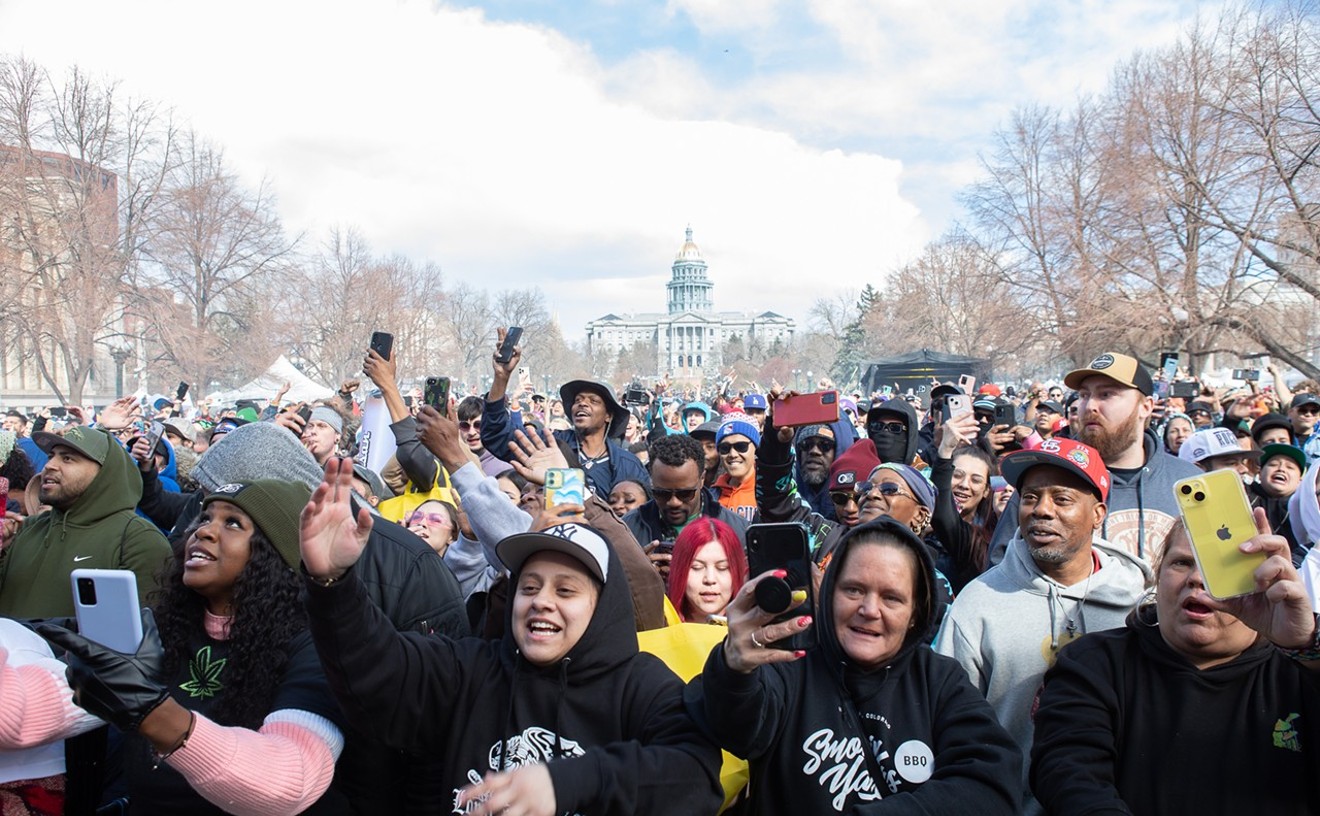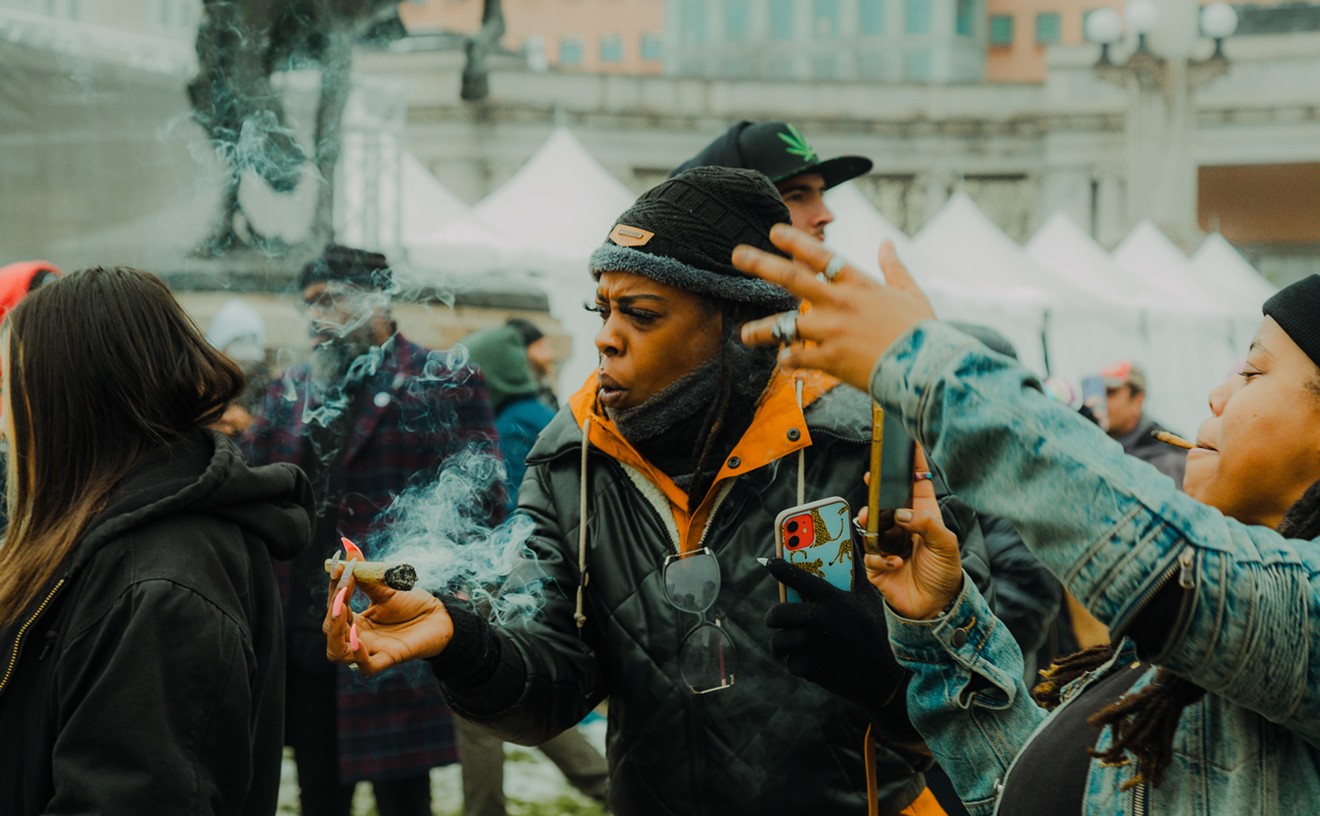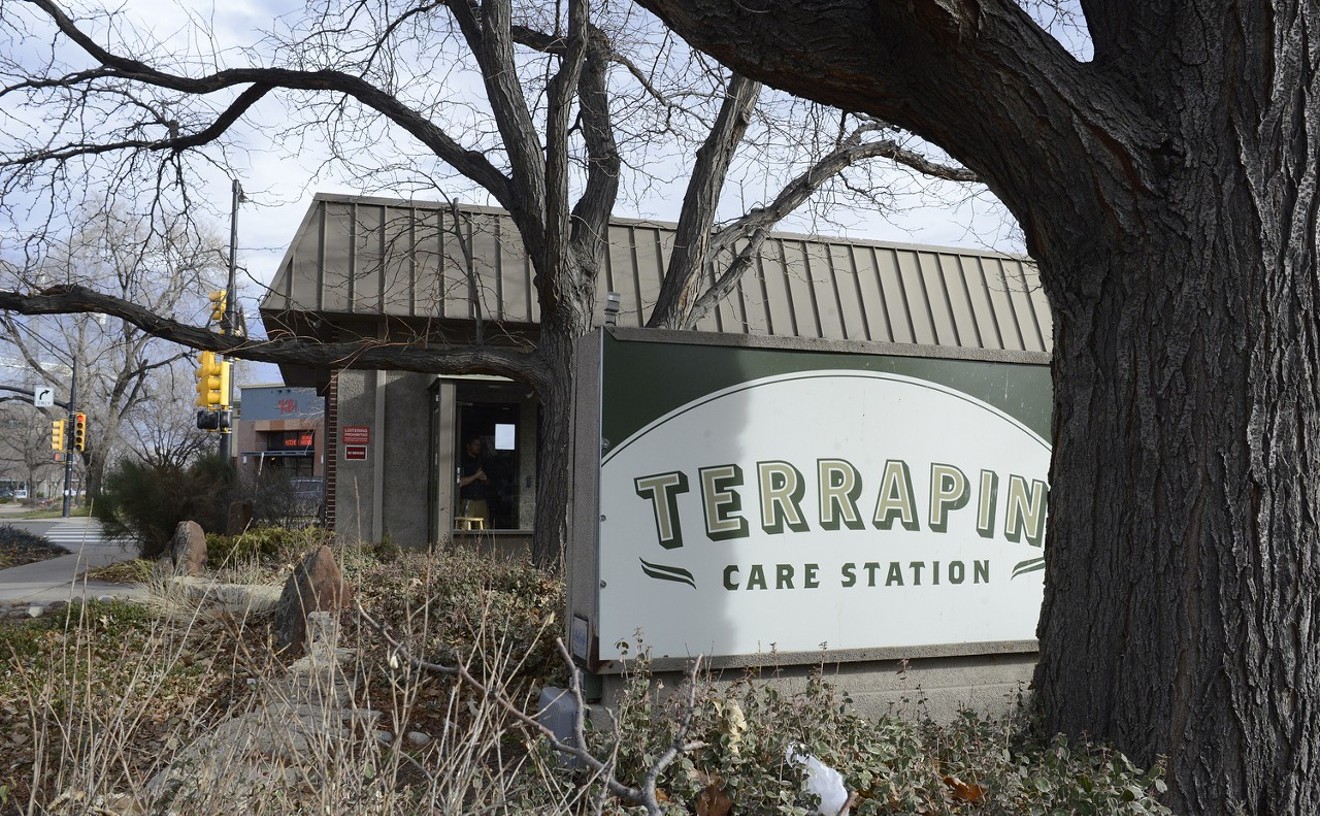The tension rose sharply in January, when U.S. Attorney General Jeff Sessions revoked the Cole Memorandum and years of other protective federal guidelines. As a result of the revocation, state-legal cannabis businesses worried about imminent enforcement actions, but Troyer's office quickly issued a statement saying that Sessions's new memorandum wouldn't change the way his office approached cannabis enforcement. A phone call with concerned Colorado politicians further squelched the fires, and they came away believing that Troyer would continue focusing on opioids, immigration and violent crime rather than state-legal cannabis.
But that was nine months ago, and according to Troyer, things have changed. The U.S. Attorney was quoted in a September 30 Denver Post story, warning of looming enforcement action against one of Colorado's largest cannabis businesses and making it clear that state compliance isn't a shield against the feds if he believes a business is a threat to public safety. Troyer doubled down in an op-ed published the same day, in which he cited alarming data from the infamous Rocky Mountain High Intensity Drug Traffic Area report — a report routinely criticized by state officials and members of the cannabis industry for lacking context — as evidence of why Colorado needs to rethink its decision to legalize the plant.
Westword sat down with Troyer to talk about his recent op-ed, the decision by voters in 2012 to legalize cannabis, and his plans for future law enforcement in Colorado.
Westword: What was your reasoning behind the op-ed? Was there any straw that broke the camel’s back?
Bob Troyer: It was a combination of factors. One of the key factors was that it's a slightly more calm period of the year. It's the end of the outdoor cultivation season, with no legislation sessions pushing this bill or that bill. The [Denver] City Council hasn't taken up a few things yet that I was told they'd take on in the fall [Troyer is referencing the city's social consumption task force]. And then some new reports came out, so I thought now would be a good time to talk about this stuff.
The end of the harvest season is relevant because it's a time of year when I tend to reach out to the Forest Service, Bureau of Land Management, Sheriffs Association, DEA and freshen up my knowledge of what we've seen most recently, because marijuana production and the threat it is or isn't kind of evolves all the time.
After Sessions revoked the Cole Memo in January, you sent out a statement that your cannabis enforcement approach would be the same as before. Shortly after, Congresswoman Diana DeGette's office issued a release detailing a phone call that she had with you, during which your office reportedly said it would still be allocating a majority of its efforts toward opioids, immigration and violent crime. Has anything changed since that phone call?
Yes. We do a lot of different things here. I don't remember whose characterization [of the phone call] that was, but I do remember the phone call very well. It was with a lot of congresspeople giving mini-speeches, but I don't recall exactly what I said. What I was trying to emphasize is that the way we do all the criminal work in this office is pretty damn simple: You look at the map [he points to a map of Colorado], which is my district of responsibility, and say, "What are the greatest community and safety threats unless we step in?"
At that time, that was accurate. Those three you listed, as well as meth — I don't think that was listed, but it's at the top of everyone's list as a drug threat to the users and public safety — we still have those problems, but what's changed since January in terms of the marijuana threat are a couple of different things: We put in a lot of effort with sheriffs and Forest Service in the 2017 outdoor black-market grow season, really trying to eradicate the large-scale, infrastructure-based grows on U.S. Forest Service land. We were effective in doing that; that was a much smaller problem during the summer of 2018 than it was in 2017.
That problem has reduced, but what has increased is an enormous amount of very sophisticated drug-trafficking groups, primarily Cubans and Chinese. They buy or rent homes, usually middle-class homes, completely gut them and hot-tap the electricity, dig underground and replumb the water line for free water, and do as many grows as they can get away with. All of that marijuana is for the black market. All of that marijuana is going back East, where the prices are higher.A false dichotomy developed about this definition state-compliance being relevant to my world. It's not.
tweet this
That phenomenon has exploded. It existed for years, but it really took off with a couple of specific groups. The other thing that's taken off, at least from the data we've seen, is increased marketing and use by kids and increased traffic fatalities. Those are the big changes since we had that conversation in January.
You remember that time: There was so much agitation, because there was not great communication ahead of time about what [the Sessions Memo] meant. There was so much agitation, given what had been said during the [presidential] campaign, and all that — that this might mean that U.S. attorneys are just going to pick random pot shops and prosecute them criminally to send a message or cripple the industry. There was so much speculation in January. I was just trying to emphasize that we're going to keep doing the same thing we always do, which is monitoring safety threats.
Can you speak about your office's relationship with Colorado law and marijuana enforcement? Do you work with these state and local agencies when looking into criminal activity surrounding marijuana or licensed cannabis businesses?
We do. We work regularly with criminal enforcement like police departments, sheriffs and the DEA. It's a slightly different relationship, but we also communicate with the governor's office, the director of safety for the State for Colorado, city attorneys and municipal enforcement — in Denver, in particular — as another enforcement tool.

The Sweet Leaf dispensary chain has seen all of its licenses revoked or suspended over looping allegations.
Thomas Mitchell
I can't answer that — but let's put it this way: The DA's office, city attorney's office and the MED, they have a different map that illustrates their world of jurisdictions and black and gray markets. But since this whole world, to me, is federally illegal...in this area, we communicate with them, but their only job is to regulate, audit and keep track of behavior in [this world]. That's an essential relationship so we know what's going on in Colorado and what their challenges are.
Whether it's looping or mislabeling products so they can be discarded and taken out of the seed-to-sale system — if they're seeing any tactics that are driving them crazy, we talk about those kind of things. It's information- sharing, which is part of what I was talking about in terms of knowing what's going on in the state.
Has that communication changed since recreational cannabis sales began?
Yes, it's evolved. At the beginning, both sides were distrustful of each other. We here hesitant of having any relationship, thinking that would be used against us as a claim of signing off on what [Colorado regulators and lawmakers] did; they were scared to talk to us because they assumed that we thought they were evil. I mean, we could've technically charged them with a crime. So it took a couple years for everyone to relax a little bit and realize we're all trying to do the same thing.
You've worked hard to outline the differences between your world and federal laws and the State of Colorado's when talking about state-compliant cannabis businesses. Can you give any examples on how the two could conflict?I get that the 151 percent increase in traffic fatalities is not perfect proof that retail marijuana legalization caused each one of those accidents. But it's a trend that didn't exist before.
tweet this
I'm hesitant to describe a situation and have someone think that as long as they're not doing that, they're okay. There are a lot of ways and motivation given the money in this business, and there's a lot of intelligence and creativity to find ways to be state-compliant. When looping started, people were engaged in conduct that MED would call illegal looping, but had arguments that they were still state-compliant because the language wasn't clear.
I think those same arguments exist with the rules around which products you can deem "not useful," or whatever the phrasing in the regulations that allows them to be pulled out of that seed-to-sale tracking system — then what happens to it? It's a subjective call. I know there's some sort of exploitation of that loophole. How, exactly? I'm not sure. There's plenty of diversion.
It's more sophisticated than selling out the back door. It's not just turning the lights off and selling your inventory. There are opportunities within the regulatory system to divert that product in here or out of state — normally out of state, because the prices are so much better, so why wouldn't you?
I don't think anyone did this intentionally, but sort of a false dichotomy developed about this definition of state compliance being relevant to my world. It's not.
Here's an example: Someone is using carbofuran, which is a banned nerve agent in the U.S. that Mexican traffickers historically use in their illegal public land grows. If there were someone with a state license, and everything was clean and by the book — but they were using carbofuran and dumping it into Cherry Creek, that's a threat. Would we use our federal drug law or environmental law or some other regulatory tool to shut that down? I don't know, but that's an example of a fully state-compliant business that is damaging the community with the way they make their product. That's something where we'd say, "I don't give a shit if they're state-compliant or not."
It could be something like pushing the marketing of highlighter vape pens to kids in a way they argue is state-compliant — but what if it's a retail dispensary that's near a large high school or complex of schools, and principals are seeing an increase in kids who are high because of vape devices that are easy to avoid detection, and it traces back to a certain dispensary? Even if they're operating 100 percent by the book, we would still go after them, because that's a harm.
In a recent article in the Denver Post, you mentioned looming enforcement action against one of Colorado's largest dispensary chains. What are you able to share about that?That's something where we'd say, "I don't give a shit if they're state-compliant or not."
tweet this
No more than I already did. There is a looming action.
Some of the data you cited in your op-ed, particularly the state's youth usage being 85 percent above the national average and pot-related traffic fatalities increasing 151 percent, doesn't tell the whole story. The most recent Colorado Healthy Kids survey from 2017 shows youth use is 1 percent lower than the national average, while the Colorado Department of Transportation points out that the traffic fatalities increase doesn't differentiate having THC in one's system and THC being an active intoxicant. (Those numbers are much, much lower.) How hard is it to find reliable data around cannabis, and is there a need for more baseline and contextual data surrounding cannabis?
There's a huge need for that. I would hope the industry, citizens and law enforcement could all agree on that. That's why the theme of my piece was "Let's just take a breath." I'm aware, and law enforcement is aware, that a lot more study needs to be done. What we object to is rushing forward without doing these studies and getting that real data.
If you noticed, in the op-ed I didn't mention the RMHIDTA's remarks on crime increases since the passage of Amendment 64. I get that there are a lot of flaws in concluding a causation relationship when you don't account for population growth or other factors that may or may not have increased crime. But some of these numbers should just give us pause to do further study and analysis on the health and safety side.
So instead of law enforcement just throwing out a study that the industry says exaggerates traffic fatalities while poking holes in it, like "it measures only the metabolites, it's not the active THC, it doesn't account for user tolerance," let's work together with law enforcement to find the answer. It's the dynamic that delayed the research and public awareness of how tobacco causes cancer. You had this relationship where scientists in the 1930s said there might be a link, and the industry was always undercutting the science that was being developed instead of working with science to get to an accurate picture and agree upon reasonable regulations.
There may well be, and I hope there are, positive medicinal uses for marijuana. That needs to be studied, though, and proven true before we just say that CBD reduces anxiety in dogs. We know there's some shit out there like that, like the newspaper report in Maine where this lady has a lobster stand and is blowing marijuana smoke in a large container, sealing them up together and seeing if it made the lobster more mellow. She called it an "exit strategy." Did you see that?
Coffee shops are another one. You can get a shot of CBD added to your coffee. Why are you doing that? It doesn't get you high, you don't have Dravet Syndrome — the one medical use where we've seen actual reduction in this specific kind of adolescent epilepsy. So you want to put some in your coffee and see what happens?
But about studying safety effects: I get it. I get that the 151 percent increase in traffic fatalities is not perfect proof that retail marijuana legalization caused each one of those accidents. But it's a trend that didn't exist before. It's a trend we should look at and try to get better at determining what the impairment of marijuana is. How much is it? Five nanograms [the state's driving limit for the amount of THC allowed in one's blood] is just a random number.
Instead of just sitting here and screaming these numbers are accurate and arguing who's right and wrong, the need is for us to get good data. We've got to get better at pinning down causation with these things and not just going with correlation.
But we didn't have 80,000 illegal plants in the forest before 2012. We didn't have carbofuran found in streams on the Western Slope of Colorado before legalization, we didn't have massive out-of-state diversion. It'd be impossible to prove exact causation, but it's something you have to look at chronologically.













